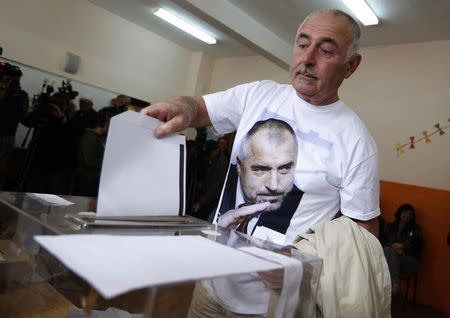Rightist party set to win Bulgaria's 'last chance' election
By Tsvetelia Tsolova and Matthias Williams SOFIA (Reuters) - The center-right GERB party looked set to win Bulgaria's "last-chance" snap general election on Sunday but will fall short of a majority, a result that could mean another shaky coalition struggling to solve a bank crisis and revive growth. GERB's leader, a former bodyguard and karate expert, warned it would be difficult to form a government in light of the exit poll results, but added his party would hold internal discussions on Monday on how to proceed. The exit polls indicated GERB won about 33 percent of the vote, more than twice as much as their main Socialist opponents but leaving them around 36 to 38 seats shy of a majority. That will likely set the stage for days or weeks of haggling with smaller parties and the opposition to shore up support, or at worst send Bulgarians to the voting booths yet again. The new government will be the Balkan country's fifth in under two years, a period that has seen mass street protests topple a previous GERB administration and nearly fell its successor. More instability would be a turn-off for investors as well as voters, who have seen their country lurch from one crisis to the next. Foreign direct investment has fallen by more than a fifth this year. Underscoring the high level of disillusionment with the political class, the exit polls suggested voter turnout was the lowest in the 25 years since Bulgaria emerged from communism. They also pointed to a highly fractured result, with a record eight parties possibly entering parliament, as disappointment with the main parties strengthened the attractions of fringe players. "Under this configuration, I do not see how a government can be formed," a sombre-sounding Borisov told reporters. Signaling he would likely try to form a coalition, Borisov also said he was prepared to take "all risks" to govern the country and would do "everything necessary" to avoid another election. But in a possible sign of trouble ahead, a senior official of the Reformist Bloc - seen as GERB's most likely ally - said he couldn't envisage Borisov as the next prime minister. A Socialist Party spokesman called the result a "heavy defeat". "With such a fragmented parliament, it's difficult to form a government and it also raises the question of how stable it will be," said Dimitar Bechev, a political analyst based at the London School of Economics. Early official results matched those of the exit polls. They showed GERB winning 33.6 percent of the vote compared with 15.8 percent for the Socialists, with 12.9 percent of votes in. PROBLEM BANK A top priority for the new government will be to decide what to do with Corporate Commercial Bank (Corpbank) <6C9.BB>, Bulgaria's fourth-biggest lender, which was closed after a run on deposits in June and whose fate has been in limbo ever since. The bank's customers have been shut out of their accounts for more than three months and the main shareholder is charged with embezzlement. But efforts to sort out the mess were derailed by political squabbles and it is still not clear whether the authorities will rescue the bank, or how its depositors and bondholders might be treated. The bank crisis fed the sense of frustration with Bulgaria's political class. Seven years after the nation of 7.3 million joined the EU with high hopes of prosperity, corruption remains endemic, while one in five Bulgarians lives below the poverty line. The average salary is just over 400 euros ($500) a month. While casting his vote, Borisov had said Sunday's poll was a "last chance" to save Bulgaria and warned, if no government was formed and another election was called, "then there will be nothing left to fix in the country." Bulgaria has been in the hands of a caretaker government since August, following the collapse of a Socialist-led administration whose year in power was overshadowed by mass protests, deadly floods and a row over Russian energy supplies. "I decided to support some of the new faces. Why vote for those who have robbed us in the past years?" said shop assistant Lyubomira Besheva, in her 30s, at a polling station. Officially no exit polls were allowed to be published until 1600 GMT, but that did not stop some media publishing voting patterns thinly disguised as weather reports or song contests. NEED FOR REFORM Tucked into the EU's southeastern edge on the Black Sea, Bulgaria left communism behind a quarter of a century ago, but loyalties remain divided between old ally Moscow and Brussels. Heavily dependent on Russian energy, Bulgaria is among the countries most vulnerable to a gas supply cut if the standoff between the West and Russia over Ukraine continues into winter. Bulgaria's new government will have to walk a diplomatic tightrope over the proposed construction of the giant, Russian-led South Stream gas pipeline, which will bypass Ukraine. Under pressure from the EU and the United States, Sofia reluctantly halted work on the project in June. The next administration will also have to persuade parliament to let the government raise new debt to fund a higher fiscal deficit and provide liquidity buffers for the banking system, and plug a large financial hole in the energy sector. To make matters worse, the EU has frozen hundreds of millions of dollars worth of development funds since last year, citing irregularities in the public procurement process. "We all know that nothing will change, but the elections are another reason for us to analyze things as we know best: with a salad and a brandy," said Kalin Vasilev in a Sofia pub. "We know they (the politicians) will lie to us again," he said. "If you took things too seriously in Bulgaria, you'd have to shoot yourself." (Writing by Matthias Williams; Additional reporting by Angel Krasimirov; Editing by Kevin Liffey and Dominic Evans)



